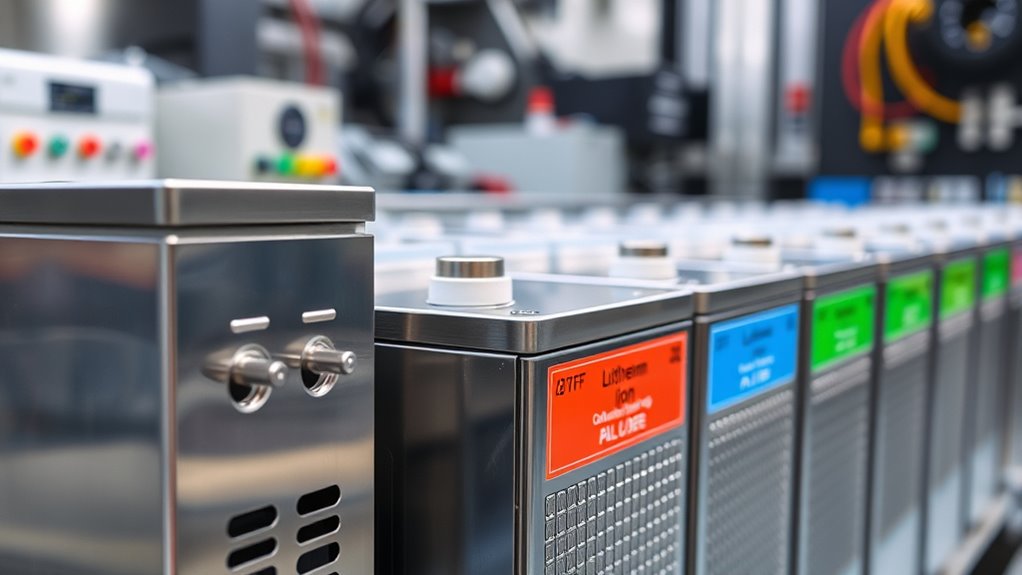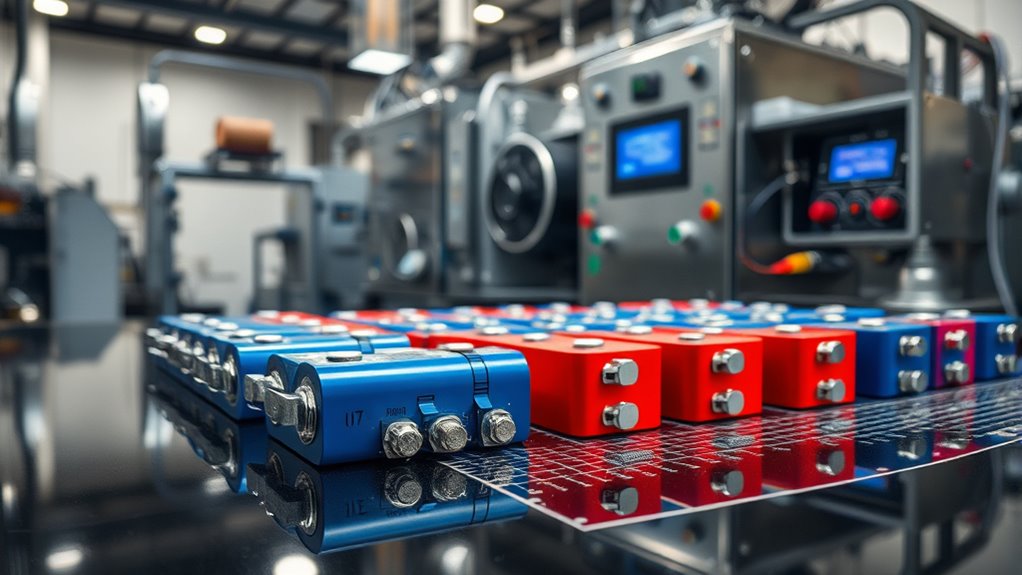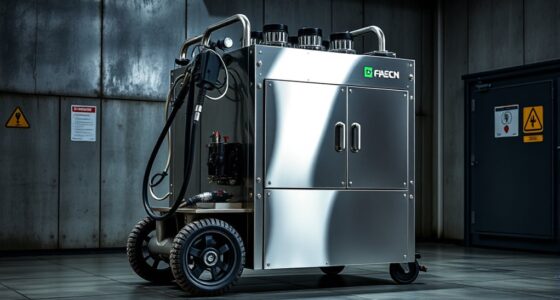Choosing the right battery chemistry for your specialty machine is key to optimizing performance, longevity, and safety. Different chemistries, like lithium-ion or lead-acid, affect how long your battery lasts, how well it handles charge cycles, and how safe it is during operation. Proper management of charging protocols and maintenance tailored to the chemistry can greatly extend your battery’s life. Keep exploring to discover how selecting the ideal chemistry can boost your equipment’s reliability and efficiency.
Key Takeaways
- Different battery chemistries, such as lithium-ion and lead-acid, are chosen based on performance and operational demands of specialty machines.
- Lithium-ion batteries generally offer longer cycle life and higher energy density suitable for demanding applications.
- Proper charging protocols tailored to each chemistry extend battery lifespan and ensure safety in specialty equipment.
- Managing chemical reactions within batteries is critical to maximize durability and minimize degradation over time.
- Maintenance practices must align with chemistry-specific requirements to optimize reliability and reduce replacement costs.

Have you ever wondered what makes different batteries perform so differently? It all comes down to their chemistries and how they’re designed to operate under specific conditions. When it comes to specialty machines, understanding the nuances of battery chemistries becomes even more critical because these devices often demand high performance, reliability, and safety. One of the key factors influencing a battery’s suitability for such applications is battery longevity. Some chemistries naturally last longer than others, providing more charge cycles and a more extended overall lifespan, which reduces replacement costs and downtime. For example, lithium-ion batteries tend to have a longer cycle life compared to lead-acid batteries, making them a popular choice for high-demand equipment. But longevity isn’t just about the chemical makeup; it also hinges on how you manage the battery’s charging protocols.
Charging protocols refer to the specific procedures and parameters you follow when recharging a battery. Proper protocols are essential because they directly impact battery longevity and safety. For instance, overcharging or charging too quickly can accelerate degradation, causing capacity loss and reducing the overall lifespan. Similarly, undercharging can lead to incomplete chemical reactions within the cell, which hampers performance over time. Different chemistries require tailored charging protocols to optimize their lifespan and performance. Lithium-ion batteries, for example, benefit from controlled, limited charging voltages and current rates to prevent overheating and overvoltage stress. Conversely, nickel-based batteries may need different charging strategies to avoid memory effects and capacity fade.
In specialty machines, adhering to correct charging protocols isn’t something you can overlook. Manufacturers often specify exact voltage and current limits, and following these guidelines ensures the battery operates at peak efficiency while minimizing wear. Some advanced systems even incorporate smart chargers that automatically adjust charging rates based on real-time battery health data. This approach helps extend battery longevity by preventing common issues like overcharging or excessive heat buildup. Additionally, understanding the Best Airless Paint Sprayer can provide insights into the importance of proper maintenance and operation for optimal performance. Ultimately, understanding and implementing the appropriate charging protocols for your specific battery chemistry can markedly enhance the performance and lifespan of batteries used in specialty machines. It’s about respecting the chemistry’s unique requirements and managing the charging process diligently. When you do, you’ll enjoy more reliable operation, fewer replacements, and a better return on your investment in these high-performance power sources.
Frequently Asked Questions
How Do Battery Chemistries Affect Machine Safety Features?
You should know that different battery chemistries impact your machine’s safety features by affecting battery stability and fire safety. For example, lithium-ion batteries may pose a higher risk of thermal runaway, so your safety system needs to incorporate advanced monitoring and thermal management. Selecting the right chemistry helps prevent fires and ensures your machine operates safely, reducing the chances of accidents caused by battery failures.
What Are the Environmental Impacts of Different Battery Chemistries?
You should consider that different battery chemistries impact the environment uniquely. For example, lithium-ion batteries can cause resource scarcity due to their reliance on rare minerals, and they pose battery toxicity risks if not properly recycled. Lead-acid batteries are heavier and contain toxic lead, which can contaminate ecosystems. Choosing eco-friendlier options, like sodium-ion or solid-state batteries, helps reduce resource strain and minimizes environmental harm.
How Does Temperature Influence Battery Performance in Specialty Machines?
Like a delicate dance, temperature deeply influences your battery’s performance. When thermal effects are too high or low, they can cause your battery to falter, impacting reliability and lifespan. You need to contemplate chemistries compatibility, as some perform better in extreme conditions than others. By managing temperature carefully, you ensure your specialty machine operates smoothly, avoiding surprises and keeping your work steady and confident, no matter the environment’s demands.
Are Certain Chemistries More Cost-Effective Long-Term?
You’ll find that some chemistries offer better cost efficiency over time, especially when you compare different chemistries. Lithium iron phosphate (LiFePO4), for example, usually costs more upfront but lasts longer, saving you money in the long run. When doing a chemistries comparison, consider factors like cycle life, maintenance, and safety. Choosing the right chemistry depends on your specific needs, but focusing on long-term benefits can lead to better cost efficiency.
What Are the Recycling Options for Various Battery Chemistries?
Did you know only about 5% of batteries are properly recycled globally? You can explore recycling procedures tailored to each chemistry, like lithium-ion, lead-acid, or nickel-metal hydride. For battery disposal, check local regulations and certified facilities that handle hazardous waste. Proper recycling diminishes environmental impact, recovers valuable materials, and ensures safety. By understanding these options, you help promote responsible handling and sustainable reuse of battery resources.
Conclusion
Think of each battery chemistry as a different kind of tool in your toolbox, each suited for unique jobs. Just like you wouldn’t use a hammer to screw in a bolt, selecting the right chemistry guarantees your specialty machine runs smoothly and efficiently. By matching the right battery to your needs, you’re like a skilled craftsman, crafting success with each power source. When you pick wisely, your machine becomes an unstoppable force, ready to conquer any task.








